

Why I’m Reading No New Books. Donald Knuth, a renowned mathematician and recipient of the Turing Award (considered the Nobel Prize of computer science), retired from using email in 1990.
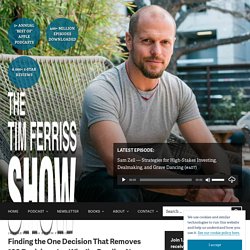
He issued a public statement on his Stanford faculty page, which I saved to Evernote 1–2 years ago. I think of it often, and my favorite portion is below: “I have been a happy man ever since January 1, 1990, when I no longer had an email address. Weaving Inquiry Into Independent Reading: Using Student-Written Reading Goals to Develop Metacognition AND A Love of Reading.
The Struggle For Both For years, as a fifth grade teacher, I felt like I had to choose between helping kids develop a pure love of reading or helping kids develop skills of metacognition during our independent reading time.
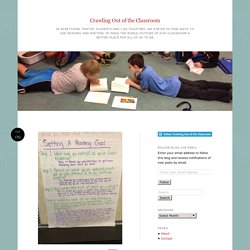
I knew that the research showed that when kids notice their own thinking, when they are metacognitive, then they were growing as readers. I also knew that there was nothing that provoked more whining and complaining from my fifth graders than being asked to stop and write as they read or to do longer pieces of writing about the reading that they were doing. So there were years I stopped the metacognition piece completely and just let kids read without asking them to notice or track their thinking in any ways.
And then I would feel guilty. To remember things you read. Stop Trying To Memorize — A Good Book Will Change You. Here’s what happened when I started taking notes Following Ryan’s advice, I started copying paragraphs and quotes I found insightful when I finished each book.
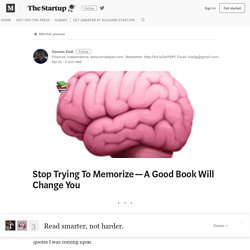
It went well for a while. The guilt of “wasted” reading went away and I felt I was building this incredible personal database of knowledge. Then something curious happened. Sorry, But Speed Reading Won’t Help You Read More. The late Nora Ephron famously felt badly about her neck, but that’s minor compared to how people feel about their reading.
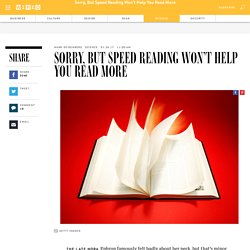
We think everyone else reads faster than we do, that we should be able to speed up, and that it would be a huge advantage if we could. You could read as much as a book critic for the New York Times. You could finish Infinite Jest. Skim reading is the new normal. The effect on society is profound. Look around on your next plane trip.
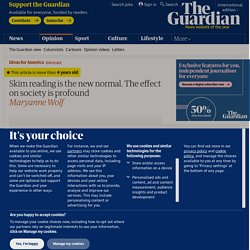
The iPad is the new pacifier for babies and toddlers. Younger school-aged children read stories on smartphones; older boys don’t read at all, but hunch over video games. Parents and other passengers read on Kindles or skim a flotilla of email and news feeds. Unbeknownst to most of us, an invisible, game-changing transformation links everyone in this picture: the neuronal circuit that underlies the brain’s ability to read is subtly, rapidly changing - a change with implications for everyone from the pre-reading toddler to the expert adult.
As work in neurosciences indicates, the acquisition of literacy necessitated a new circuit in our species’ brain more than 6,000 years ago. This is not a simple, binary issue of print vs digital reading and technological innovation. 8 Things I Learned Reading 50 Books A Year For 7 Years. I’ve read over 300 books since the beginning of 2011, not counting the many I started but didn’t finish and the endless content we all read online.
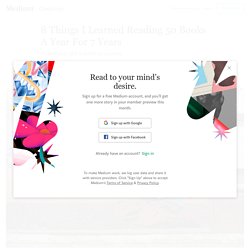
5 Ways Reading Makes You a Better Leader. Pollsters say reading is in decline.
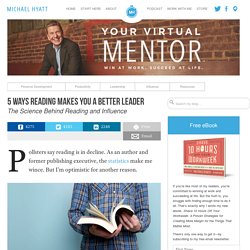
As an author and former publishing executive, the statistics make me wince. The Buffett Formula. “The best thing a human being can do is to help another human being know more.” — Charlie Munger “Go to bed smarter than when you woke up.” — Charlie Munger Most people go through life not really getting any smarter.
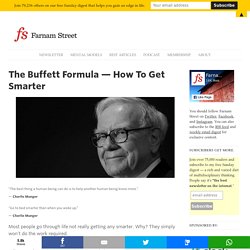
Why? They simply won’t do the work required. It’s easy to come home, sit on the couch, watch TV and zone out until bed time rolls around. Sure you can go into the office the next day and discuss the details of last night’s episode of Mad Men or Game of Thrones. But you can acquire knowledge if you want it. In fact there is a simple formula, which if followed is almost certain to make you smarter over time. It involves a lot of hard work.
We’ll call it the Buffett formula, named after Warren Buffett and his longtime business partner at Berkshire Hathaway, Charlie Munger. “I can see, he can hear. We can learn a lot from them. Metacognition.
Reading Comprehension: How to Retain More of Every Book You Read. Read More: The Simple System I Use to Read 30+ Books/Year. Warren Buffett, the man commonly referred to as the greatest investor of the 20th century, was standing in front of 165 wide-eyed students from Columbia University.
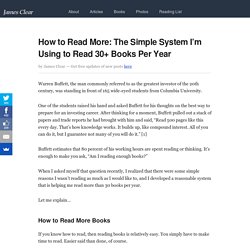
One of the students raised his hand and asked Buffett for his thoughts on the best way to prepare for an investing career. After thinking for a moment, Buffett pulled out a stack of papers and trade reports he had brought with him and said, “Read 500 pages like this every day. That’s how knowledge works. It builds up, like compound interest. 10 Rules to Read More Books This Year. One New Year’s resolution I frequently hear from people is that they want to read more books.
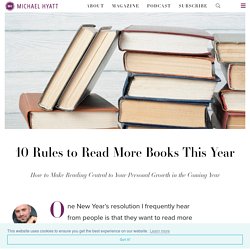
Makes sense if you consider reading a key component of personal growth and development. Ray Edwards recently wrote about his reading goals here at MH&Co. 6 Techniques for Building Reading Skills. As avid lovers of literature, teachers often find themselves wanting to impart every bit of knowledge about a well-loved text to their students. And this is not just an ELA issue—other disciplines also often focus on the content of a text. However, teaching reading skills in English classes and across the disciplines is an almost guaranteed way to help students retain content. Unfortunately, the tendency to focus on the content is a real enemy to the ultimate goal of building reading skills. Get More Out of the Books You Read With an Idea Index.
100 Good Books to Read: Book Recommendations by Topic. Best Articles: Over 100 Interesting Articles to Read. Book Depository: Millions of books with free delivery worldwide.